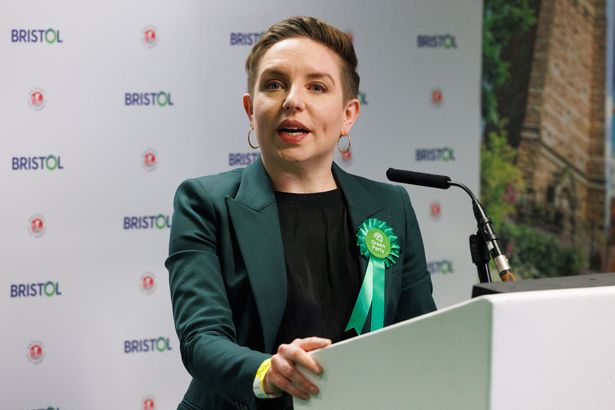A new bill going through parliament does not go far enough, an MP says Houses(Image: Getty Images)
Houses(Image: Getty Images)
A Government bill to give more powers to local councils and regional authorities should include the power for local councils like Bristol to trial controlling how much rent private landlords can charge tenants. That’s the view of one of the city’s MPs, who has called on ministers to include the option in the Devolution Bill that’s currently going through Parliament.
With Bristol the second most expensive place in Britain to be a renter, Carla Denyer said the new bill to give more powers to local communities was an opportunity to see if the much-talked-about idea of rent controls could work in Bristol.
Despite a cross-party agreement at City Hall back in 2023 for Bristol to ask the Government for the power to set up a rent cap scheme, successive Governments – Tory and now Labour – have dismissed the idea. In 2024, the Green MP for Bristol Central tried, and failed, to get rent controls included in the new Labour Government’s Renters Reform Bill, but a second opportunity came along with the Devolution Bill.
Rents in Bristol are at an all-time high, with recent research revealing that the city has rents – and the proportion of people’s income they have to spend on rent – that are second only to London.
The average renter in many parts of Bristol is spending 45 per cent of their income on rent, with some having to hand over two-thirds or even three-quarters of their wages to their landlord just to carry on living in their homes.
READ MORE: Bristolians asked to back Carla Denyer MP and call for rent controlsREAD MORE: Young people in Bristol say they are being forced out of city over soaring rents
Having rent controls, or at least the power to try it to see if it makes a difference, was one of the key action points from the Renters Commission that was created by the previous Labour administration at City Hall back in 2023.
Back then, the then Labour council asked the then Conservative Government for the power to include a rent cap mechanism on its existing landlord licensing system, but the Government rejected the idea.
What is changing?
Now there’s a Labour Government, and a reform of the rental system is back on the agenda. The new Government’s Renters Reform Bill did touch on the idea of some kind of limit to the amount of rent a landlord could charge, but according to Ms Denyer, did not go far enough.
The Renters Reform Bill, which is expected to get Royal Assent later this year and come into force next year, will limit the ability of landlords to increase the rent to just once a year, and increases the notice landlords have to give for a rent increase from one month to two.
The new law also cements a renters’ right to challenge any rent increase at an independent tribunal, and will ban that tribunal from imposing an even higher rent figure.
Other changes coming through with the Rent Reform Bill will be a ban on landlords and lettings agencies conducting ‘bidding wars’, which drive up rents even before someone has moved in. That phenomenon was the subject of a high profile campaign in 2023 by tenants’ union ACORN, and Bristol City Council agreed to use the powers they do have through landlord licensing to crack down on the practice.
 Members of the tenants union ACORN lobby outside offices of CJ Hole lettings agencies across Bristol(Image: Acorn Bristol)
Members of the tenants union ACORN lobby outside offices of CJ Hole lettings agencies across Bristol(Image: Acorn Bristol)
Now, through the Renters Reform Bill, it will be outlawed altogether by national law, and the bill gives councils the power to fine landlords or lettings agencies £7,000 if a breach is found.
But despite lobbying from Bristol’s politicians, the Renters Reform Bill does not give councils the power to impose rent caps or controls, so proponents of the idea have looked for new opportunities.
Is the idea dead in the water now?
With the Renters Reform Bill nearing the end of its journey through Parliament, a new proposed law – the English Devolution and Community Empowerment Bill – has been seen as a new opportunity by proponents of rent controls.
The bill looks to increase the powers local councils and regional authorities like WECA have on a range of different issues, and it’s in its early stages, with more committee sessions scheduled next month.
Carla Denyer (Green, Bristol Central) and the London Labour MP Bell Ribeiro-Addy called on the Government to include the ability for a local council or regional authority to create pilot schemes to test rent controls.
 General Election 2024 from Bristol Central count Friday 5 July 2024, at Oasis Academy Brislington. Carla Denyer wins Bristol Central.(Image: PAUL GILLIS / Reach PLC)
General Election 2024 from Bristol Central count Friday 5 July 2024, at Oasis Academy Brislington. Carla Denyer wins Bristol Central.(Image: PAUL GILLIS / Reach PLC)
“Bristol City Council has had a cross party vote, including Labour councillors, saying they want the power to pilot rent controls,” said Ms Denyer. “And recent results have come out that show that typical private renters in my constituency of Bristol Central spent 45 per cent of their income on rent. That is not sustainable. This bill did offer the opportunity for that pilot.
“In Bristol, even Labour know we need rent controls to stop greedy landlords ripping off renters, but their colleagues in Govt haven’t caught up yet. Why not use the devolution bill to give regions the power to bring in rent controls?” she added.
“I am worried that not enough is being done to protect private renters,” Ms Ribeiro-Addy said. “In Lambeth, nearly a third of residents are renters. Rents are rising faster than wages, and the average renter is paying 72 per cent more than the national average, which is leaving many families struggling and in poverty.
“The Renters’ Rights Bill was definitely a step in the right direction, but it fell short on rent hikes. This Bill is an opportunity to give metro mayors the power to bring in rent controls and protect renters in their cities,” she added.
What are the pros and cons of rent caps?
Bristol’s Renters Commission was split on the idea. Unsurprisingly, tenants and housing charities were in favour of the idea, while Bristol’s landlord lobby groups were against. Rent caps have been controversial around Europe, but are not uncommon, and where they have started they tend to still be in place.
Rent cap systems exist, or have been tried, in Ireland, France, Finland, Berlin and the Catalonia region of Spain, principally in Barcelona. In the rest of Spain, Portugal, Italy, Poland, Germany and the Netherlands, there are stricter laws that moderate rent increases and limit the amount rents can go up by.
Rent controls were introduced in the aftermath of the Covid pandemic back in 2020 and 2021 in Berlin, a city which faces a spiralling housing crisis. Detractors of the idea of rent controls, who are principally landlords and free-market championing politicians, said research in the first year of Berlin’s experience trialling rent controls showed a reduction in the number of new properties on the market, and a sharp increase in the number of prospective tenants inquiring about or applying to rent properties on the market.
 Paris(Image: Getty)
Paris(Image: Getty)
In France, the measures have been controversial. The measures are more recent, and are being trialled in 72 municipalities of France, and there are calls to make the trial permanent.
In Paris, where they were introduced back in 2019, housing chiefs said the rent caps kept the average rent 8.2 per cent lower in the first year than they would otherwise have been, but critics say there are knock-on or unwanted side effects, principally a reduction in the supply of homes available to rent.
Across France, counter-intuitively, rent controls have been seen as more successful in making rents more affordable in areas where there wasn’t a huge housing crisis – like Paris – and those involved in the debate in France point out that the Olympics held in Paris skewed the more recent statistics.
In Berlin, rent caps were introduced at the start of 2020, but lasted less than 18 months. They were backed by hundreds of thousands of people who were renting, who found their rents capped or even reduced, but the wealthy and powerful landlord lobby took legal action, and by April 2021, had successfully persuaded a court to rule the system ‘unconstitutional’, and the cap was scrapped.
